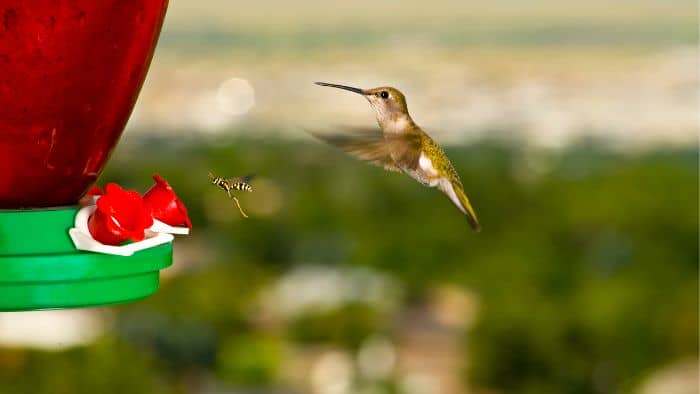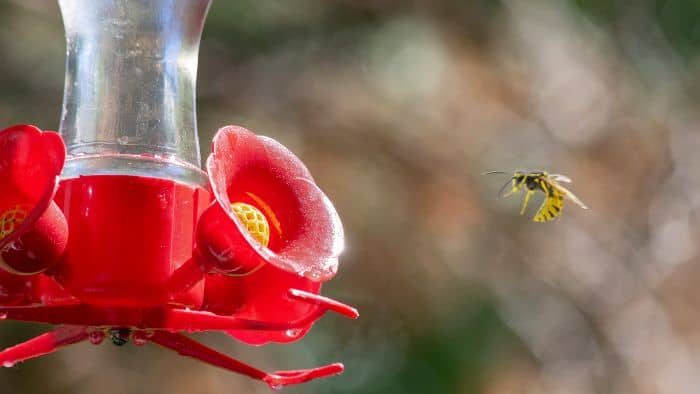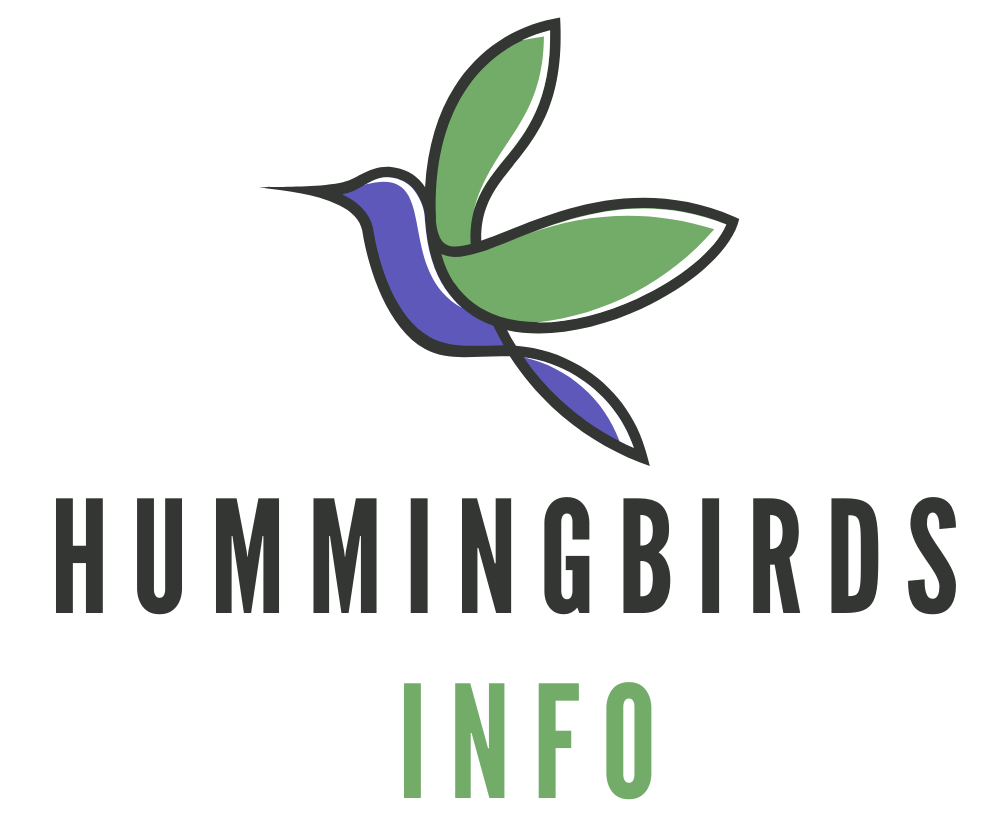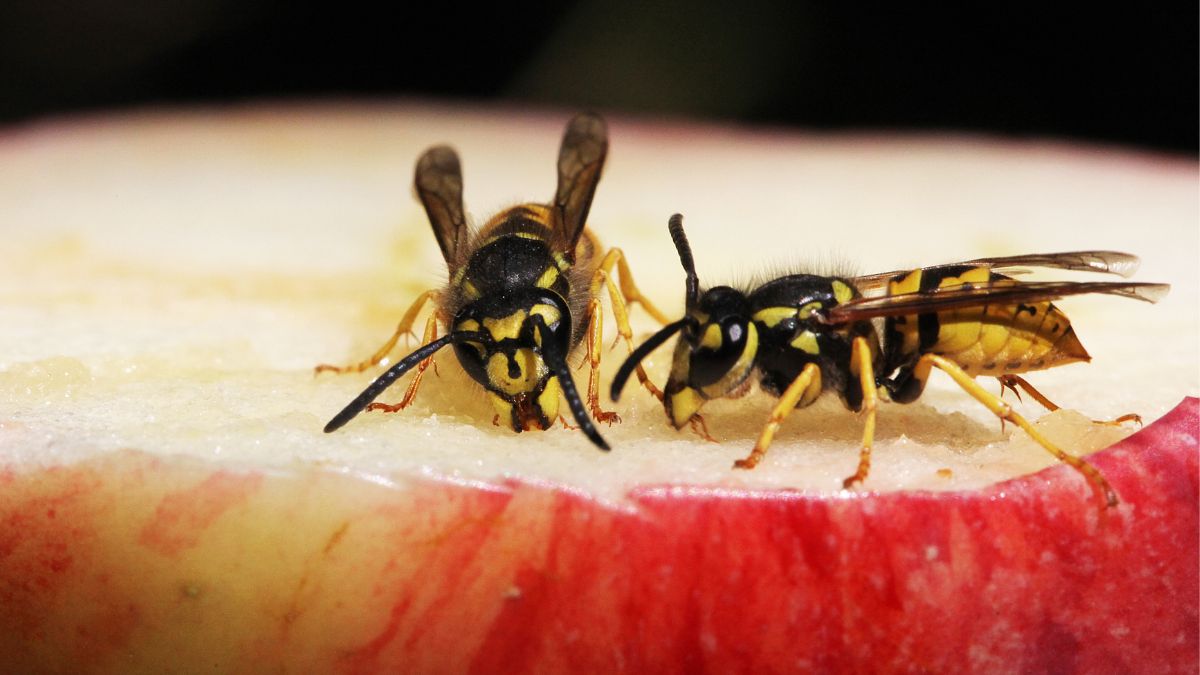Do wasps sting hummingbirds? Check out this article, you might be quite surprised at the answer.
Experienced birders or not, there’s hardly a person who doesn’t enjoy feeding birds, and few birds are as exciting to watch as hummingbirds. These brilliant and precision-flying creatures shine in full sunlight just like jewels.
Feeders and flower gardens are great ways to attract these birds, and if they provide an abundant food source, you can expect the hummingbirds to return year after year. Unfortunately, not only hummingbirds are attracted to a good nectar recipe, but also some other sweet-loving insects such as wasps. Do wasps sting hummingbirds? Find out below.
Why Do Wasps Approach Hummingbirds?
If you’ve noticed that recently wasps are increasingly invading the personal space of hummingbirds, or worse than that, a wasp in a hummingbird feeder, you’re not the only one.
Namely, as summer comes to an end and autumn slowly begins to knock on the door, there are changes in the environment that directly affect the behavior of wasps. This is precisely why we see these insects much more often than usual in this period. So, although it doesn’t seem like that at first, there aren’t more of them at this time of year, instead, we have a lot more contact with them and are more aware of their presence as summer begins to give way to autumn.
Wasps, therefore, collect food for the winter, they look for sweet food and sources of protein. Considering that it is a good supply of nectar, feeders intended for hummingbirds are one of the wasps’ favorite places to steal food.
Keep in mind that when a hummingbird notices that these insects are often hanging around, they will avoid your feeder as they might feel disturbed, preferring to treat your neighbor with a visit if his feeder provides a safe haven and plenty of food.
Now let’s move on to the main part of this article, where you will find out the answer to the question: “do wasps sting hummingbirds”.

Do Wasps Sting Hummingbirds?
In the battle of who is more important, hummingbird vs wasp, there is no single winner. Why is that so? It’s pretty straightforward, both wasps and hummingbirds are equally important to our ecosystem. We want both flying species to equally visit our fragrant flowers and gardens and yards.
Insects are part of the hummingbird’s daily menu, and in addition, they compete with each other for nectar. It is simply a life cycle with one species relying on another. We won’t lie, hummingbirds are known to be quite aggressive creatures. However, with good reason, when they lack food or when another creature disturbs and pollutes the feeder.
It’s the same with wasps, these insects are even more aggressive, and there are records of them even fighting with these birds so much that at one point they start chasing them around. However, do wasps sting hummingbirds? The answer is YES!
Since they don’t lose their sting like some other insects as bees do, these mischievous creatures can sting and hurt their prey multiple times, and worst of all, the pain is the same intensity from the first time to the last.
We learned that it can seriously injure him, but can a wasp kill a hummingbird? Unfortunately, the answer to this question is also affirmative. We even heard a story about one poor hummingbird that suffered terribly. Namely, the wasp’s head was stuck on its beak and thus made it impossible for this little bird to feed normally, causing the unfortunate to die of starvation. what a terrible way to die, isn’t it?
How To Get Rid Of Wasps Around Hummingbird Feeder
Now that you know the answer to the question of the day: “do wasps sting hummingbirds”, and how serious the consequences can be, we will show you how to avoid it.

#1: Clean the Feeder Regularly
Feeders aren’t a set-it-and-forget-it thing. They need to be cleaned regularly because the nectar can splash or crystallize due to a large amount of sugar. Don’t forget to clean the outside of the feeder from spilled nectar, as well as look for leaks, all of which are very attractive to wasps and can sound like an invitation to come.
#2: Periodically Switch Location
Did you know that insects like wasps like to have a well-established routine that they don’t want to break for any reason? They always choose to stay in places with a stable and easily accessible food source, which is exactly why changing the location of the feeder seems like a smart idea.
You don’t have to do it regularly, but as needed, as soon as you notice wasps looking for nectar in the feeders.
#3: Stick to the Diluted Solution
*1 part sugar to 4 parts water is the ideal ratio. Insects like wasps like slightly sweeter solutions compared to these birds, so stick to this ratio and fill the feeders with a diluted solution. The reduced sweetness will keep hummingbirds while repelling wasps.
#4: Set Wasp Traps
One way to attract the attention of wasps is to set traps designed just for them. Truth be told, you can also make a DIY project (bottle trap), but it’s much easier to buy one. These traps are specially designed to lure these insects into a chamber filled with bait (sugary solution, vinegar, meat, dish soap, etc.).
Once they get inside there is no way out. This option is quite harsh, so we recommend it be the last one. What do you think about the unnecessary killing of pollinators?
To Conclude: Do Wasps Sting Hummingbirds?
As much as you may adore both, it would be best to keep wasps and hummingbirds away from each other. Although small and quite cute, both flying creatures are territorial and aggressive and could injure each other.
Unfortunately, wasps have a tendency to sting hummingbirds and can do so an unlimited number of times because, unlike bees, their stinger doesn’t fall off when they sting.
If you have any questions, please, let us know in the section below.
FAQs
Read more about Do Bougainvilleas Attract Hummingbirds? The Final Verdict of the Experts

